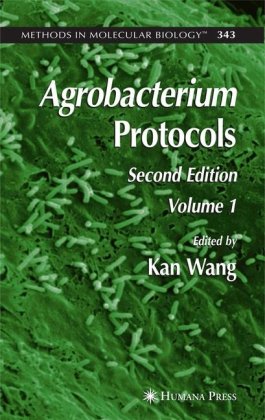

Most ebook files are in PDF format, so you can easily read them using various software such as Foxit Reader or directly on the Google Chrome browser.
Some ebook files are released by publishers in other formats such as .awz, .mobi, .epub, .fb2, etc. You may need to install specific software to read these formats on mobile/PC, such as Calibre.
Please read the tutorial at this link. https://ebooknice.com/page/post?id=faq
We offer FREE conversion to the popular formats you request; however, this may take some time. Therefore, right after payment, please email us, and we will try to provide the service as quickly as possible.
For some exceptional file formats or broken links (if any), please refrain from opening any disputes. Instead, email us first, and we will try to assist within a maximum of 6 hours.
EbookNice Team

Status:
Available0.0
0 reviewsRapid changes and significant progress have been made in the use of Agrobacterium to genetically transform plants for both basic research purposes and agricultural development. In Agrobacterium Protocols, Second Edition, Volumes 1 and 2, a team of leading experts and veteran researchers describe in detail their best techniques for delivering DNA to plant cells and permanently altering their genomes. Volume 1 details the most updated techniques available for twenty-six plant species drawn from cereal crops, industrial plants, legume plants, and vegetable plants, and presents various methods for introducing DNA into three major model plant species, Arabidopsis thaliana, Medicago truncatula, and Nicotiana. The authors also outline the basic methods in Agrobacterium manipulation and strategies for vector construction, major components of plant transformation that are often neglected by many plant biologists. Volume 2 contains another thirty-three proven techniques for root plants, turf grasses, woody species, tropic plants, nuts and fruits, ornamental plants, and medicinal plants. Additional chapters provide methods for introducing DNA into non-plant species, such as bacteria, fungi, algae, and mammalian cells. The protocols follow the successful Methods in Molecular Biology™ series format, each offering step-by-step laboratory instructions, an introduction outlining the principles behind the technique, lists of the necessary equipment and reagents, and tips on troubleshooting and avoiding known pitfalls.
Comprehensive and highly practical, Agrobacterium Protocols, Second Edition, Volumes 1 and 2 offers plant biotechnologists a gold standard collection of Agrobacterium-mediated transformation techniques for state-of-the-art plant genetic engineering, functional genomic analysis, and crop improvement, and for inspiration in developing new methods for other related and non-related plants.